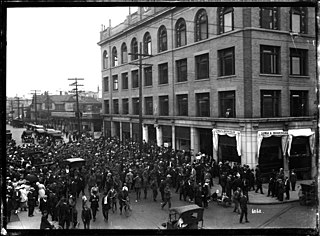Related Research Articles
Labour laws are those that mediate the relationship between workers, employing entities, trade unions, and the government. Collective labour law relates to the tripartite relationship between employee, employer, and union.

Strike action, also called labor strike, labour strike, or simply strike, is a work stoppage caused by the mass refusal of employees to work. A strike usually takes place in response to employee grievances. Strikes became common during the Industrial Revolution, when mass labor became important in factories and mines. As striking became a more common practice, governments were often pushed to act. When government intervention occurred, it was rarely neutral or amicable. Early strikes were often deemed unlawful conspiracies or anti-competitive cartel action and many were subject to massive legal repression by state police, federal military power, and federal courts. Many Western nations legalized striking under certain conditions in the late 19th and early 20th centuries.
Overtime is the amount of time someone works beyond normal working hours. The term is also used for the pay received for this time. Normal hours may be determined in several ways:
The 35-hour workweek is a labour reform policy adopted in France in February 2000, under Prime Minister Lionel Jospin's Plural Left government. Promoted by Minister of Labour Martine Aubry, it was adopted in two phases: the Aubry 1 law in June 1998 and the Aubry 2 law in January 2000. The previous legal working week was 39 hours, established by President François Mitterrand, also a member of the Socialist Party. The 35-hour working week had been on the Socialist Party's 1981 electoral program, titled 110 Propositions for France, but was not pursued because of the poor state of the economy.

The rights and duties for employees, labor unions, and employers are set by labor law in the United States. Labor law's basic aim is to remedy the "inequality of bargaining power" between employees and employers, especially employers "organized in the corporate or other forms of ownership association". Over the 20th century, federal law created minimum social and economic rights, and encouraged state laws to go beyond the minimum to favor employees. The Fair Labor Standards Act of 1938 requires a federal minimum wage, currently $7.25 but higher in 29 states and D.C., and discourages working weeks over 40 hours through time-and-a-half overtime pay. There are no federal laws, and few state laws, requiring paid holidays or paid family leave. The Family and Medical Leave Act of 1993 creates a limited right to 12 weeks of unpaid leave in larger employers. There is no automatic right to an occupational pension beyond federally guaranteed Social Security, but the Employee Retirement Income Security Act of 1974 requires standards of prudent management and good governance if employers agree to provide pensions, health plans or other benefits. The Occupational Safety and Health Act of 1970 requires employees have a safe system of work.
Labor rights or workers' rights are both legal rights and human rights relating to labor relations between workers and employers. These rights are codified in national and international labor and employment law. In general, these rights influence working conditions in the relations of employment. One of the most prominent is the right to freedom of association, otherwise known as the right to organize. Workers organized in trade unions exercise the right to collective bargaining to improve working conditions.
A full-time job is employment in which workers work a minimum number of hours defined as such by their employer.
The weekdays and weekend are the complementary parts of the week devoted to labour and rest, respectively. The legal weekdays, or workweek, is the part of the seven-day week devoted to working. In most of the world, the workweek is from Monday to Friday and the weekend is Saturday and Sunday. A weekday or workday is any day of the working week. Other institutions often follow this pattern, such as places of education. The constituted weekend has varying definitions, based on determined calendar days, designated period of time, and/or regional definition of the working week. Sometimes the term "weekend" is expanded to include the time after work hours on the last workday of the week.
Japanese labour law is the system of labour law operating in Japan.
Annual leave is a period of paid time off work granted by employers to employees to be used for whatever the employee wishes. Depending on the employer's policies, differing number of days may be offered, and the employee may be required to give a certain amount of advance notice, may have to coordinate with the employer to be sure that staffing is available during the employee's absence, and other requirements may have to be met. The vast majority of countries today mandate a minimum amount of paid annual leave by law.

Labor relations is a field of study that can have different meanings depending on the context in which it is used. In an international context, it is a subfield of labor history that studies the human relations with regard to work in its broadest sense and how this connects to questions of social inequality. It explicitly encompasses unregulated, historical, and non-Western forms of labor. Here, labor relations define "for or with whom one works and under what rules. These rules determine the type of work, type and amount of remuneration, working hours, degrees of physical and psychological strain, as well as the degree of freedom and autonomy associated with the work." More specifically in a North American and strictly modern context, labor relations is the study and practice of managing unionized employment situations. In academia, labor relations is frequently a sub-area within industrial relations, though scholars from many disciplines including economics, sociology, history, law, and political science also study labor unions and labor movements. In practice, labor relations is frequently a subarea within human resource management. Courses in labor relations typically cover labor history, labor law, union organizing, bargaining, contract administration, and important contemporary topics.

The New Zealand Employment Relations Act 2000 is a statute of the Parliament of New Zealand. It was substantially amended by the Employment Relations Amendment Act 2001 and by the ERAA 2004.
A collective agreement, collective labour agreement (CLA) or collective bargaining agreement (CBA) is a written contract negotiated through collective bargaining for employees by one or more trade unions with the management of a company that regulates the terms and conditions of employees at work. This includes regulating the wages, benefits, and duties of the employees and the duties and responsibilities of the employer or employers and often includes rules for a dispute resolution process.
In Chile, workers have the right to form and join unions without prior authorization, and approximately 10% of the total work force is unionized.
Iranian labor law describes the rules of employment in Iran. As a still developing country, Iran is considerably behind by international standards. It has failed to ratify the two basic Conventions of the International Labour Organization on freedom of association and collective bargaining, and one on abolition of child labor. Countries such as the US and India have also failed to ratify many of these Conventions and a mere 14 other Conventions, only 2 since the Islamic Revolution.
European labour law regulates basic transnational standards of employment and partnership at work in the European Union and countries adhering to the European Convention on Human Rights. In setting regulatory floors to competition for job-creating investment within the Union, and in promoting a degree of employee consultation in the workplace, European labour law is viewed as a pillar of the "European social model". Despite wide variation in employment protection and related welfare provision between member states, a contrast is typically drawn with conditions in the United States.
French labour law is the system of labour law operating in France.
The Labor policy in the Philippines is specified mainly by the country's Labor Code of the Philippines and through other labor laws. They cover 38 million Filipinos who belong to the labor force and to some extent, as well as overseas workers. They aim to address Filipino workers’ legal rights and their limitations with regard to the hiring process, working conditions, benefits, policymaking on labor within the company, activities, and relations with employees.

The Fair Work Act 2009(Cth) is an Act of the Parliament of Australia, passed by the Rudd government to reform the industrial relations system of Australia. It replaced the Howard government's WorkChoices legislation, it established Fair Work Australia, later renamed the Fair Work Commission.
Israeli labor law provides a number of protections to workers in Israel. They are governed by the Basic Laws, the Hours of Work and Rest Law, as well as various other laws, statutes, and regulations.
References
- ↑ "1908 Grevleri".
- 1 2 "Working in Turkey".
- ↑ "Fisher Phillips: Fisher Phillips Turkey Continues its Reform of Labor and Employment Laws".
- ↑ "Work-life balance". 30 June 2013.
- 1 2 "Terms of Employment - Invest in Turkey".
- ↑ "I don't have dreams - Childhood Lost. Syrian children asylum seekers working in Turkish factories".